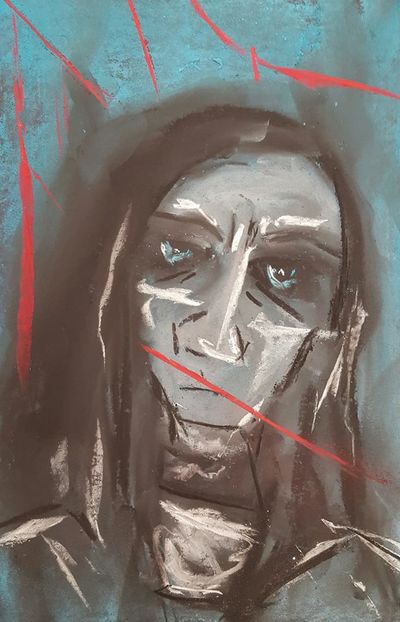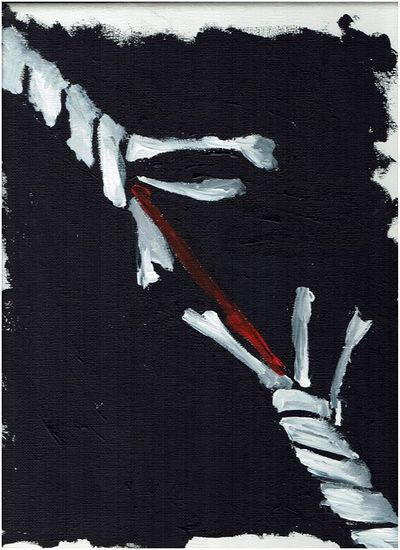Kaela
Eternal of Winter
Sobriquets
Most commonly, Kaela is called the Lady of the Grim Host after the army of undying warriors she commands.
She is also known as the Sorrowful One, sometimes as End-of-Strength, sometimes as The Lady of Oblivion. Among the Icewalkers of Wintermark she is called the Cold-Hearted; the Urizen stargazers refer to her as Dark-Between-The-Stars and say she despises and fears the Net of the Heavens; the Navarr call her Queen of Silence and say that she despises music and dance; and in The Marches she is called The Black Dog.
Her influence is strong in Axos and, to a lesser degree, the Sarcophan Delves. The Axou call her Queen Esk and seek her favour; there are several covens of magicians who serve as her agents selecting the best and brightest to convey to her presence so she may add them to her Grim Legion. In the Sumaah Republic she is shunned; magicians who deal with her are likely to face charges of blasphemy, heresy, idolatry or all three. In the Asavean Archipelago she is worshipped as a goddess - she is referred to as la Reine qui siège sur le Trône Noir (the Queen on the Black Throne) and it is customary for wealthy Asaveans, especially those of advanced age, to offer a sacrifice of food, wine and blood to her at the Winter Solstice.
Appearance
This Winter eternal appears either as a pale-skinned woman dressed in black armour, usually with a helmet crowned with the antlers of an elk and bearing a great axe, or as an ancient crone dressed in dark-green and black with jewellery made from finger-bones. Traditionally she has appeared dressed as a Varushkan wise-one or boyar, but in recent decades she has taken to attire reminiscent of The Brass Coast or The League.
Kaela is never encountered alone; she is always accompanied by the warriors of her grim legion and by her undying attendants.
Concerns
Kaela exemplifies weakness, despair, old-age, senility and desperation. She takes no joy in these things, but presents them as simple, unquestionable facts. Everything fails. Everything dies. Everything falls apart. In the end, entropy wins.
It is not a matter of whether things will collapse, merely a matter of when. She respects those who strive to hold back the end... as long as they accept that the end is inevitable, that there is no hope. Likewise she appreciates those who work to open the eyes of others to the essential futility of existence... as long as they accept that their own actions are largely meaningless as well, in the long term. Optimists and priests alike tend to incur her cold wrath.
Despite her concern with ending and death, she is not especially interested in the undead. Husks, wights, ghosts and the like are said to bore her. At the point where a being becomes undead, they have already died - already lost - and undead creatures are pitiful shadows of living beings. In some cases, according to scholars, she has referred to them literally as shadows - cast-off by the mortal who created them. Like many Winter eternals her pragmatic nature does not balk at the use of the undead as tools, but she does not consider them people. Her grim legionnaires are sometimes mistakenly referred to as undead, but she prefers to call them "unliving" - they are neither alive, nor dead, and have never actually stopped living.
Unlike beings such as Llofir however, Kaela does not despise the undead - for the most part she simply ignores them. She rarely, if ever, offers boons that destroy them, and never offers boons that allow them to be created except in the most short-lived circumstances (such as by enhancing the ability of Quickening Cold Meat to call forth Winter spirits to temporarily ride empty corpses).
Many priests despise Kaela; they fear that she is trapping human souls, removing them from the cycle of reincarnation. The Synod has prevailed on the Conclave several times to declare her an enemy of the Empire. Some theologians speculate that the undying legions do not have souls at all; that the human dies, and their soul moves on to the Labyrinth, and that the grim warriors are merely memories of themselves, little more than husks animated by a particularly strong animus. Speculation is likely to continue, as Kaela herself has no interest in answering questions about souls; she is generally dismissive when challenged.
In Wintermark she is strongly associated with the runes Kyrop and Yoorn. Recent research in Miaren has also brought to light a connection between the eternal and Rhonwen's Fall.
Boons
Kaela's gifts are sorrow, despair and weakness; very few people want them for themselves. She can also offer wisdom, but always at a price - usually blindness or crippling infirmity. Some scholars say this is proof that she is connected to The Thrice-cursed Court; others point out that what she offers is wisdom, not power and that while the two appear similar, in the Winter realm they are poles apart.
Her greatest boon, and the one she is most often approached to provide, is release from the fear of death (for at least as long as Creation endures). She can take someone who is not dead, even if they hover on the very brink of death, and bring them to her hopeless realm to live on for eternity as one of her undying warriors. Sometimes she allows magicians to invoke her grim legion to fight alongside living warriors, but this return to the mortal realm is always short-lived, and is a cruel reminder of the light, life, colour and joy that can never be experienced in the domain of Kaela.
Kaela prefers to take warriors over civilians, but anyone who has fought and striven in life who wishes to avoid death at any cost may find a place in her sorrowful court. Very rarely, she will bring forth a specific member of her legions to speak to mortals, provided they can be invoked by name and is among the legion. It is entirely at her whim if she chooses to do so. She can even be prevailed upon to allow one of her legion to die, but she will certainly charge a high price for this 'gift'.
Some seek out her ability to grant a painless death - she is said to be able to end anything that exists. She can kill a willing individual with a gentle caress, and it is said that even an apparently immortal creature such as a Volodny can be obliterated by her kiss. However, she is not a murderer and has no interest in forcing extinction on anyone. Only those who embrace death willingly will receive the painless death she offers. Her ability to kill is not limited to living beings - she is often evoked when performing Words of Ending, Black Iron Blade or by those attempting to unravel a permanent curse or enchantment.
Very rarely, Kaela offers a boon to an artist who has attracted her attention. She is known to appreciate well-crafted lays of lament, tragic poems, sad songs and theatrical events that end in despair, sorrow and bittersweet loss. A musician, playwright or poet who seeks to win her approval must be careful however, as she is known to dismiss those who fail to please her with a curse or a crippling malediction.
The Gift of Kaela
During the Autumn Equinox 382YE, the eternal was granted amity by the Conclave. This allowed her to reach out her cold hand to the Empire and offer them her gift - a gift she has also offered to Imperial citizens outside Imperial borders.
Secured through a bargain with the Winter Archmage, the gift allows any Imperial citizen in the hands of the Druj to choose to die painlessly. No corpse remains for the Druj to defile, to impale, or to use to taunt the living - the body turns to dust and ashes. This gift extends across the entire eastern Empire, and into the Mallum, Zenith, and the Barrens.
During the Autumn Equinox 385YE, the Order of the Sevenfold Path raised a declaration of concord committing their order to speak to Imperial priests about the Gifts of Kaela on how both gifts - of oblivion and membership of the grim legion – are not to be feared. The gift allows any Imperial citizens fighting in the vallorn miasma to choose death and dissolution before their bodies could be infested with the vallorn's sick version of immortality.
OOC Note: Using the gift requires thirty seconds of appropriate roleplaying. This ability may be used by player characters captured by the Druj during an event or who is dying in an area of vallorn miasma; if you do so you should ensure that you mark your character as dead as soon as you can so that your egregore is aware of your death. There is however one drawback to this, as Imperial magicians may soon discover: anyone who takes advantage of this ability cannot be contacted with Whispers through the Black Gate.
This ability is an exception to the normal rules on using abilities while terminal; a terminal character can use this ability if they are captured by the Druj or fallen in vallorn miasma.
"But never forget that it is fleeting.
"Even if you manage to avoid violence, accident, pestilence... even then you will age; you will decline; you will grow weak and infirm; your vision will dim, you will begin to forget; and then you will die. So will everyone you know and so will all your children down through all the ages until Creation itself gutters... and goes out like a candle.
"So by all means, return to your home and raise your family, and strive to build a better world, and fight terrible wars for what you know is right and true; it gives one real hope for the whole future of Creation... except, of course, we both know it has none."
Rituals that deal with Kaela
The following formulaic rituals are widely known to deal directly with Kaela. Rituals with an (1) are part of Urizen lore rather than Imperial lore. Rituals that are defunct - either withdrawn by the eternal or no longer functional - have a line through them.
| Ritual | Eternal | Explanation | Realm | Mag. |
|---|---|---|---|---|
| Clarion Call of Ivory and Dust | Kaela | Conjures unliving winter troops to greatly enhance the rank of a military unit when fighting in support of an army. | Winter | 20 |
It is entirely possible for a PC to join the Grim Legion in play, usually though an audience with the eternal. The PC must still be alive when they reach her chamber, and is usually terminal. A character who is accepted into the Legion feels their infirmity drop away, and is restored to full health but they can never leave Kaela's realm without her permission. The player may have time for a final farewell to loved ones, but at the end of the audience the character is considered to have died or retired and cannot be played any further.
Requests to speak to specific player characters who have joined the Grim Legion are invariably refused. Joining the Grim Legion exists as a dramatic in-character way for a terminal character to 'die' and once the role-playing is complete, there will be no further chances to play that PC just as there are none when a PC dies by any other means.
Individuals who have joined the Grim Legion are also considered dead by the egregore ability to sense if someone is alive.
